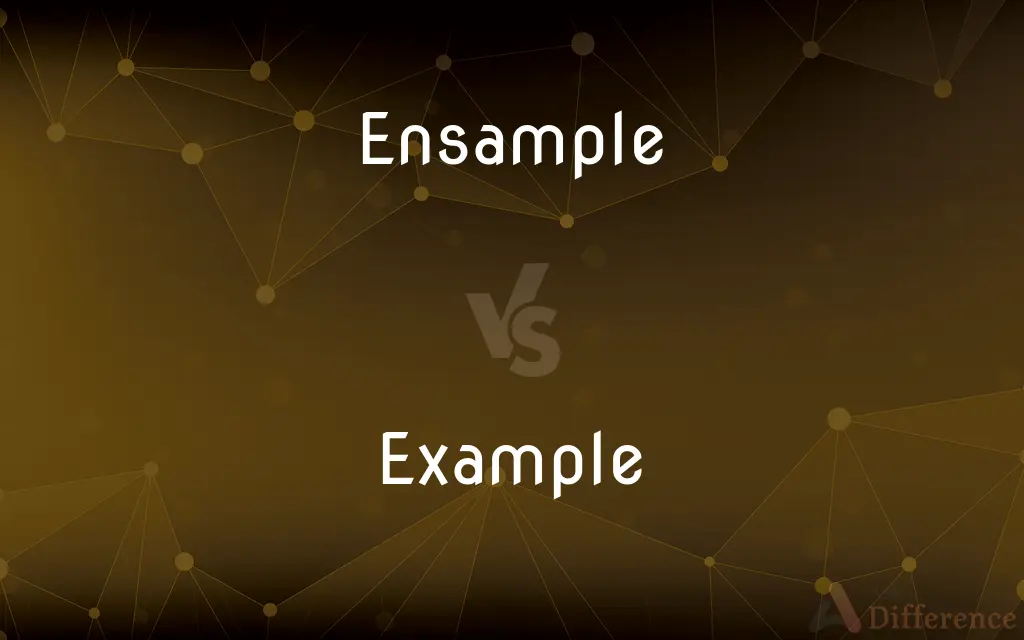Ensample vs. Example — What's the Difference?
By Tayyaba Rehman — Updated on September 25, 2023
"Ensample" is an archaic term for a moral example or model; "Example" refers to a representative form or pattern, typically used to illustrate a rule.

Difference Between Ensample and Example
Table of Contents
ADVERTISEMENT
Key Differences
"Ensample" and "Example" are both nouns, but they vary significantly in their usage and familiarity in contemporary English. "Ensample" is an archaic term that was predominantly used to denote a moral example or a model to be followed. It’s usually encountered in older literary works or translations of religious texts, where moral and ethical guidance was being provided.
Conversely, "Example" is a highly versatile and commonly used word in modern English. It refers to a representative form or pattern, typically employed to illustrate or explain a rule, method, or behavior. It is not restricted to moral or ethical contexts and can be applied broadly to various situations, making it a more flexible and universal term compared to "Ensample."
"Ensample" is rarely used in modern English, and its occurrence is primarily limited to texts with a historical or religious orientation, reflecting its archaic nature. In contrast, "Example" is universally recognized and is a fundamental component of everyday language, used to elucidate concepts, ideas, and behaviors across diverse domains.
"Ensample" has a more narrow and specific connotation, largely associated with providing moral or ethical models to be emulated. "Example," on the other hand, has a broad and inclusive meaning, encompassing instances, illustrations, and prototypes intended to clarify or exemplify something.
"Ensample" and "Example," although similar in denotation, differ vastly in connotation, applicability, and prevalence, with "Example" being the more versatile and universally accepted term in contemporary language, while "Ensample" remains a relic of the past, preserved in historical and religious literature.
ADVERTISEMENT
Comparison Chart
Usage
Archaic, rare
Common, widely used
Connotation
Moral or ethical example or model
Representative form or pattern to illustrate or explain a rule
Context
Predominantly in historical or religious texts
In various situations and contexts
Flexibility
Limited to moral or ethical guidance
Broad and versatile
Prevalence
Mostly in older literary works or religious translations
Fundamental component of everyday language
Compare with Definitions
Ensample
An outdated term for a moral or ethical model or example.
The saint's life served as an ensample of virtue for the villagers.
Example
A representative form or pattern used to illustrate or clarify a rule or concept.
His solution provided an excellent example of how to approach such problems.
Ensample
A historical term denoting a pattern or model of moral behavior.
The knight’s valor and nobility were the ensample for every warrior.
Example
A sample or model that is typical of a group, illustrating a general rule or pattern.
The artifact is a prime example of ancient craftsmanship.
Ensample
An archaic expression referring to an exemplar to be emulated, typically in moral conduct.
The king was an ensample of justice and fairness in the ancient texts.
Example
An instance serving as an illustration or clarification of a rule, principle, or concept.
She gave an example to elucidate the complex theory.
Ensample
An old term used for a prototype illustrating proper moral or ethical conduct.
The old scriptures provided an ensample for righteous living.
Example
A precedent or model to be emulated or avoided.
His dedication sets an example for others to follow.
Ensample
A bygone word signifying a representation or example of moral or ethical behavior.
His life of service was an ensample to all who knew him.
Example
A specific case used to demonstrate or support a general statement or theory.
She cited several examples to substantiate her argument.
Ensample
(archaic) An example; a pattern or model for imitation.
Example
A thing characteristic of its kind or illustrating a general rule
Advertising provides a good example of an industry where dreams have faded
Ensample
(obsolete) To exemplify, to show by example.
Example
A person or thing regarded in terms of their fitness to be imitated
It is important that parents should set an example
He followed his brother's example and deserted his family
Ensample
An example; a pattern or model for imitation.
Being ensamples to the flock.
Example
Be illustrated or exemplified
The extent of Allied naval support is exampled by the navigational specialists provided
Ensample
To exemplify, to show by example.
Example
One that is representative of a group as a whole
The squirrel, an example of a rodent.
Introduced each new word with examples of its use.
Example
One serving as a pattern of a specific kind
Set a good example by arriving on time.
Example
A similar case that constitutes a model or precedent
A unique episode, without example in maritime history.
Example
A punishment given as a warning or deterrent
Saw the boy's suspension as an example to all students considering breaking the rules.
Example
One that has been given such a punishment
Made an example of the offender.
Example
A problem or exercise used to illustrate a principle or method.
Example
Something that is representative of all such things in a group.
Example
Something that serves to illustrate or explain a rule.
Example
Something that serves as a pattern of behaviour to be imitated (a good example) or not to be imitated (a bad example).
Nelson Mandela was an example for many to follow.
Example
A person punished as a warning to others.
Example
A parallel or closely similar case, especially when serving as a precedent or model.
Example
An instance (as a problem to be solved) serving to illustrate the rule or precept or to act as an exercise in the application of the rule.
Example
To be illustrated or exemplified (by). en
Example
One or a portion taken to show the character or quality of the whole; a sample; a specimen.
Example
That which is to be followed or imitated as a model; a pattern or copy.
For I have given you an example, that ye should do as I have done to you.
I gave, thou sayest, the example; I led the way.
Example
That which resembles or corresponds with something else; a precedent; a model.
Such temperate order in so fierce a causeDoth want example.
Example
That which is to be avoided; one selected for punishment and to serve as a warning; a warning.
Hang him; he'll be made an example.
Now these things were our examples, to the intent that we should not lust after evil things, as they also lusted.
Example
An instance serving for illustration of a rule or precept, especially a problem to be solved, or a case to be determined, as an exercise in the application of the rules of any study or branch of science; as, in trigonometry and grammar, the principles and rules are illustrated by examples.
Example
To set an example for; to give a precedent for; to exemplify; to give an instance of; to instance.
Burke devoted himself to this duty with a fervid assiduity that has not often been exampled, and has never been surpassed.
Example
An item of information that is representative of a type;
This patient provides a typical example of the syndrome
There is an example on page 10
Example
A representative form or pattern;
I profited from his example
Example
Something to be imitated;
An exemplar of success
A model of clarity
He is the very model of a modern major general
Example
Punishment intended as a warning to others;
They decided to make an example of him
Example
An occurrence of something;
It was a case of bad judgment
Another instance occurred yesterday
But there is always the famous example of the Smiths
Example
A task performed or problem solved in order to develop skill or understanding;
You must work the examples at the end of each chapter in the textbook
Common Curiosities
Is "Ensample" still used in modern English?
No, "Ensample" is archaic and rarely used in modern English.
Is "Example" limited to moral or ethical illustrations?
No, "Example" has a broad range and is not limited to moral or ethical illustrations.
Is "Example" the modern equivalent of "Ensample"?
"Example" is more versatile and is commonly used today, but it does not strictly convey the moral or ethical connotation of "Ensample."
Was "Ensample" predominantly used in religious texts?
Yes, "Ensample" is primarily found in historical or religious texts denoting moral or ethical models.
Can "Example" refer to a bad model as well?
Yes, "Example" can refer to both positive and negative models or instances.
Does "Ensample" imply a standard to be met?
Historically, "Ensample" did imply a moral or ethical standard to be emulated.
Do both "Ensample" and "Example" serve to illustrate or clarify?
Yes, but "Ensample" specifically illustrates moral or ethical conduct, while "Example" is broader.
Can "Example" be used as a verb?
No, "Example" is typically used as a noun; "exemplify" would be the verb form.
Can "Ensample" be replaced with "Example" in older texts?
It can be, but the specific connotation of "Ensample" as a moral model might be lost.
Are "Ensample" and "Example" synonymous?
They can be synonymous, but "Ensample" is archaic and specifically denotes a moral or ethical model, while "Example" is broad and used commonly.
Can "Example" be used in any context?
Yes, "Example" is versatile and can be used in various contexts to illustrate or clarify.
Can "Ensample" be used to illustrate non-moral concepts?
Historically, "Ensample" predominantly illustrated moral or ethical models to be followed.
Can "Ensample" denote a pattern of behavior?
Yes, "Ensample" historically denoted a pattern or model of moral or ethical behavior to be followed.
Is "Ensample" specific to a certain period in English literature?
"Ensample" is mostly found in older English literature, particularly in religious and moral texts.
Can "Example" be used in scientific contexts?
Yes, "Example" is highly versatile and can be used in scientific, mathematical, and various other contexts.
Share Your Discovery

Previous Comparison
Order vs. Ask
Next Comparison
Headline vs. TitleAuthor Spotlight
Written by
Tayyaba RehmanTayyaba Rehman is a distinguished writer, currently serving as a primary contributor to askdifference.com. As a researcher in semantics and etymology, Tayyaba's passion for the complexity of languages and their distinctions has found a perfect home on the platform. Tayyaba delves into the intricacies of language, distinguishing between commonly confused words and phrases, thereby providing clarity for readers worldwide.
















































